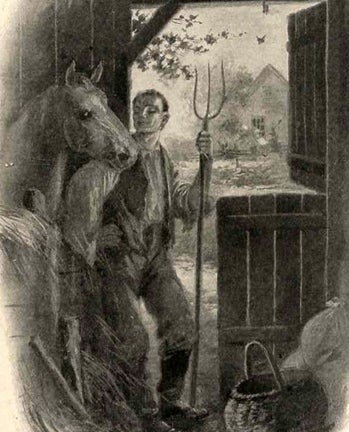 |
| This 1905 edition is selling for $140, but you can get the ebook free (source). |
American poet James Whitcomb Riley (1849-1916) had only an eighth-grade education (he graduated when he was twenty), but he was a successful newspaper reporter and a very popular poet in the 1880s and 1890s. Farm Rhymes was first published in 1888 and the poems are quite Victorian and sentimental, but I think this collection holds up better for modern adult readers than Riley's children's poems or humorous poems do, although the latter two were more popular in his lifetime.
Farm Rhymes is a short collection of simple poems about rural life, written in either Indiana dialect (I didn't find it hard to understand, and I'm not American) or standard late nineteenth century American English. Topics include harvest, fishing, family, nostalgia for childhood, and descriptions of nature - birds and woods especially. There are black and white illustrations for each poem; only a third of the pages have text on them, and there's not a lot of text on each page.
 |
| One of the illustrations. |
I read this book in about an hour one morning, it's really very short. My favourite poem out of the collection is 'When the frost is on the punkin.' It's fairly widely published on the internet, and seasonally appropriate.
A scan of the 1901 edition of Farm Rhymes is available for free on the Internet Archive. The epub doesn't preserve the line breaks and the scanning program garbled the dialect beyond comprehension, so I read the PDF. More of Riley's works are available for free on Project Gutenberg.
When the frost is on the punkin and the fodder's in the shock
And you hear the kyouck and gobble of the struttin' turkey cock
And the clackin' of the guineys, and the cluckin' of the hens
And the rooster's hallylooyer as he tiptoes on the fence
O, it's then's the times a feller is a-feelin' at his best
With the risin' sun to greet him from a night of peaceful rest
As he leaves the house, bareheaded, and goes out to feed the stock
When the frost is on the punkin and the fodder's in the shock
They's something kindo' harty-like about the atmusfere
When the heat of summer's over and the coolin' fall is here
Of course we miss the flowers, and the blossums on the trees
And the mumble of the hummin'-birds and buzzin' of the bees
But the air's so appetizin'; and the landscape through the haze
Of a crisp and sunny morning of the airly autumn days
Is a pictur' that no painter has the colorin' to mock
When the frost is on the punkin and the fodder's in the shock.
The husky, rusty russel of the tossels of the corn,
And the raspin' of the tangled leaves, as golden as the morn;
The stubble in the furries kindo' lonesome-like, but still
A-preachin' sermuns to us of the barns they growed to fill;
The strawstack in the medder, and the reaper in the shed;
The hosses in theyr stalls below the clover over-head!
O, it sets my hart a-clickin' like the tickin' of a clock,
When the frost is on the punkin and the fodder's in the shock!
Then your apples all is gethered, and the ones a feller keeps
Is poured around the celler-floor in red and yeller heaps;
And your cider-makin' 's over, and your wimmern-folks is through
With their mince and apple butter, and theyr souse and saussage, too!
I don't know how to tell it but ef sich a thing could be
As the Angels wantin' boardin', and they'd call around on me
I'd want to 'commodate 'em all the whole-indurin' flock
When the frost is on the punkin and the fodder's in the shock!
I shuddered through as I read the dialect, but lovely visions of simple beauty and life conjured nonetheless. Excuse the Edwardian-Victorian English snob;)
ReplyDeleteSome critics in Riley's time actually said that his dialect wasn't accurate to rural Indiana at all (he lived in town), but that rustic pastoral atmosphere and nostalgia for it were popular in late 19th century America, as it was getting more industrialised and more people were living in towns and cities.
DeleteI've noticed a similar sort of nostalgia for farming and nature here in town. I haven't posted about it yet, but in the writing section of the fall fair, there were an awful lot of essays and poems about like soil and organic farming and simpler times and the wonderful life of earthworms - by people who had never farmed. It was very romanticised. I should locate the photos and get on that, hopefully I didn't delete them from my phone :X
That's really interesting... Roxanna (she lives in the roundhouse on the way from Sooke road) told me about living in the woods and spinning and weaving her own clothes lol, and how her husband always waxes nostalgic for that "simple" life but how, since mostly all he did was hunting, she is happy to never return to it. Ahhh hippy days (they lived in a tree house, literally, coolest family argument EVER in that house). So a round house with a grass roof with a hobbit style fireplace is like, super modern;).
DeleteMy mom told me a very similar story about people who used to live in that house! It's easy to be nostalgic for simpler times if you weren't the one doing laundry by hand or doing all the cooking.
DeleteKinda like Thoreau; his mom was doing his laundry and cooking for him the whole time he was by the pond, I've read.
I don't know if I'll see it since I don't have transportation, but I'm looking forward to the daffodils on the roof of the round house in March.